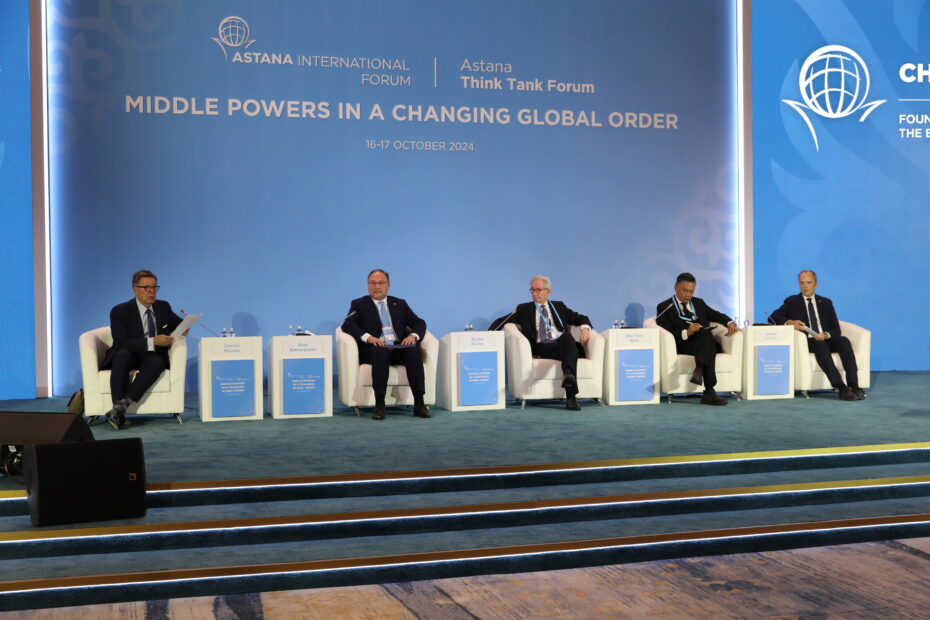On October 16, the first Astana Think Tank Forum 2024 opened in Astana on the theme: «Middle powers in a Changing Global Order: Strengthening Security, Stability, and Sustainable Development».
The event, organized by the Kazakhstan Institute for Strategic Studies under the President of the Republic of Kazakhstan, was held under the auspices of the Astana International Forum (AIF). The Forum was attended by 45 experts from 22 countries, including heads of leading foreign analytical centers, researchers, experts, and diplomats.
The Forum began with a session on the fundamentals of middle power diplomacy, moderated by Charles Mclean, Founder and Managing Director of the Borderless Consulting Group (USA). The participants discussed the strategic and diplomatic role that middle powers play in the modern global landscape.
During the discussion, the participants focused on the strategic and diplomatic role that middle powers play in today’s global landscape.
A welcoming speech was given by First Deputy Minister of Foreign Affairs Akan Rakhmetullin, who noted that the large number of participants and the comprehensive agenda of the Forum demonstrate that this type of dialogue could serve as “track 2” diplomacy. This allows analysts, researchers, and politicians to openly share their thoughts and work together to find solutions to the most complex international problems in a friendly and candid environment.
«Despite the geopolitical turbulence worldwide, our foreign policy principles remain consistent. We adhere to key principles of multivector policy, balance, pragmatism and the protection of national interests», – said A. Rakhmetullin.
According to Dino Patti Djalal, the Founder and Chairman of the Indonesian Foreign Policy Community (FPCI), the concept of a «middle power» comprises two dimensions.
«The concept of a «middle power» includes two dimensions: the first is capacity, which includes factors such as size (territorial and demographic), weight (political-diplomatic, economic) and ambitions (regional and global). The second dimension is a balanced, moderate position (middle-grounded position). For example, Kazakhstan is a middle power today more than ever before due to its increased potential and strategically balanced position, which allows it to influence the formation of the world order», – emphasized the speaker.
Joshua Lincoln, Senior Fellow at the Fletcher School’s Centre for International Law and Governance (Tufts University, USA), in his speech focused on the growing role of middle powers.
«There is a real opportunity at the moment for middle powers to strengthen their role in the international arena. This type of country has equal interests in maintaining the security system, since the issue of stability is in the DNA of these countries», – noted J. Lincoln.
Special Adviser Geopolitics (Institute Montaigne, France) Michel Duclos noted in his speech that middle powers are becoming increasingly important. «At the same time, a big challenge for middle powers is the ability to establish peace and stabilize the situation in the near future. For example, issues of reforming the UN Security Council are of particular interest to my country and other states. But I think it will be difficult to work if there is no common platform for middle powers, this applies to both the Global South and the Global North»,- said M. Duclos.
The upcoming Forum will span two days and cover geopolitical, economic, and strategic aspects of interaction from the Atlantic to the Pacific Ocean.
The participants will engage in discussions on various topics including the role of mediator countries in global conflicts, global energy security, the potential of middle powers in shaping a more balanced global system, security issues in a multipolar world, the influence of think tanks on policy formation, key trade and transport corridors, as well as stability and energy balance.
The Head of State is expected to participate in the plenary session on October 17. Furthermore, the II Central Asian Forum on Security and Cooperation will be held as part of the Astana Think Tank Forum.









